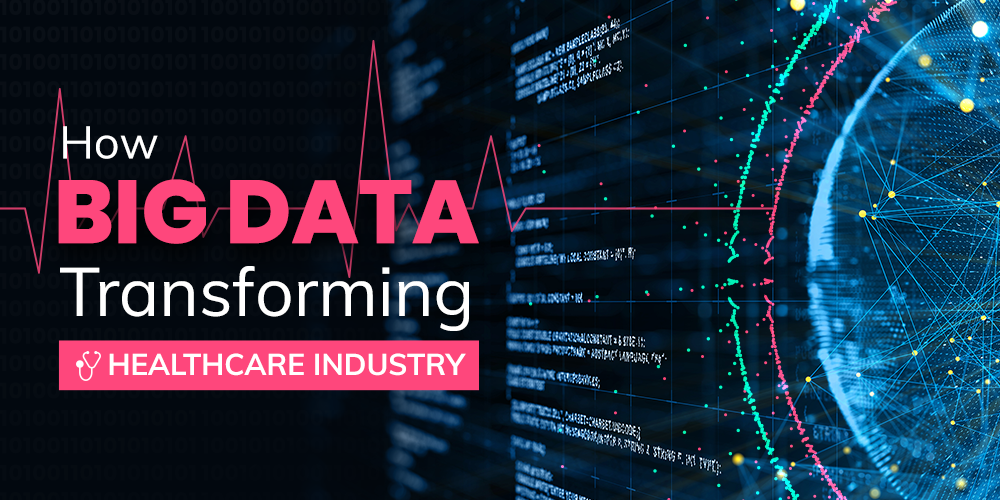How Big Data Analytics Services Change Healthcare Sector in 2023
Healthcare sector is one of the fastest growing sectors globally. It deals with a plethora of data related to patients like diagnosis and prognosis, medication, case history, etc. There, big data solutions come into the picture. When it comes to healthcare, big data involves abundant data collected from various digital and manual sources like EHRs, imaging reports, medical devices, pharmacies, and the like. Technological advancements can enable healthcare big data to provide actionable insights.
IDC (International Data Corporation) report has revealed that big data is expected to grow more rapidly in the healthcare sector as compared to other sectors like manufacturing and retail. Another report has predicted that the global big data in the healthcare domain is expected to cross $34 billion by 2022. This growth will lead us to more advanced big data analytics services, and the healthcare companies will leverage all the benefits of analytics services.
Role of Big Data Analytics Services in Healthcare1. Tracking of Vital Parameters
Wearable and medical devices gather data related to the patient’s sleep, pulse rate, heart rate, blood pressure, and other vitals. Big data analytics services enable healthcare professionals to get real-time data from wearables. The continuous monitoring of various parameters is also possible thanks to sensor-based data collection. Even if the patients are not admitted in the hospital, the professionals can track their vital parameters and take preventive measures to avoid any critical condition.
2. Cost ReductionHealth organizations can save a lot of bucks with the help of Big Data solutions. It is possible to predict the admission rate with the help of predictive analysis, and you can allocate the resources accordingly. It assists you to manage resources and operational costs while utilizing the existing staff adequately. If you own a health insurance business, wearables can help you track the patient’s location and save money in terms of hospital cash. Around 57% of healthcare companies count on predictive analytics to save costs.
3. High-Risk Patient CareData can enable healthcare service providers to understand the patient’s case history. Big data solutions enable the professionals to get the patient’s data as and when required, thereby facilitating them to take immediate action and precautionary measures during an emergency. Also, high-risk patients can get better care to help them get rid of frequent visits. Providing useful and meaningful insight is the ultimate goal of Big Data, and healthcare system can be a great beneficiary of it.
Also Read:How Big Data Analytics Helps In Delivering More Value to Your Customers4. Minimizing Human Errors
Healthcare is a sector that has no room for any errors! However, chances are high that the professionals either prescribe a wrong medicine or the patients get different medications by mistake. Big Data can help you reduce such human errors by enabling the professionals to analyze the patient’s data. Physicians who used to examine many patients in a day can find Big Data solutions very useful in prescribing proper medicines.
5. Bring AdvancementThere is no denial of the fact that the Big Data concept is capable of bringing a revolutionary change in the healthcare industry. It can provide advanced and patient-centric solutions by integrating with AI and IoT technologies. Telemedicine and remote patient examination are just a few examples of how Big Data can change the traditional way of examining and treating the patients.
Here are major applications of Big Data and how it is going to help in Healthcare SectorBig Data can make healthcare services more proactive and increase its penetration. Here are a few notable benefits of Big Data in the healthcare sector.
- Facilitates Expansion of Diagnostics Services
Data mining and analytics can help professionals identify the root cause of illness. As a result, physicians can diagnose the disease more accurately.
- Strengthens Preventive Medication
Preventive medication is aimed at preventing an epidemic. Now, Big Data solutions offer predictive analysis on the basis of data related to lifestyle, social circumstances, and other community aspects to identify the occurrence of disease in advance.
- Promotes Medical Research
This is one of the most useful benefits of Big Data and a blessing for the healthcare sector. An abundance of data related to the patient’s health records, medication, epidemic, and other health-related aspects promote both medical and pharmacological research. In a way, Big Data can help the sector find newer and more powerful ways to treat patients.
- Reduces Adverse Reaction
- Saves Cost
Big Data approach can reduce the paperwork and digitize the entire process. It results in the reduction of overheads and other expenses for the healthcare company.
Parting ShotsBig Data is the future. We can certainly expect that the Big Data solutions will not only give the competitive edge to the healthcare companies but also take the health services to the next level where patients will get the maximum benefits from accurate diagnosis and the right medication. If you own healthcare business, time is just right to avail the advantages of Big Data for your employees and patients alike.
At Semaphore, we provide comprehensive Big Data Solutions to meet all the data-related requirements of modern business. You can give your company a competitive edge in a cost-efficient way while unleashing the potential of data by choosing us as your technology partner. Our professionals have hands-on experience of using various technology stacks to address the diverse requirements of various industries like healthcare, finance, food and beverages, education, and PSUs. Just fill in a form to keep the ball rolling.


